-
01-01-2015
Low birth weight in a municipality in the southeast region of Brazil
Revista Brasileira de Enfermagem. 2015;68(6):1169-1175
Abstract
Low birth weight in a municipality in the southeast region of Brazil
Revista Brasileira de Enfermagem. 2015;68(6):1169-1175
DOI 10.1590/0034-7167.2015680624i
Views0See moreABSTRACT
Objective:
to identify the prevalence of low birth weight in the city of São Paulo.
Method:
epidemiological cross-sectional study with data collected by means of the Brazilian Live Birth Information System related to births occurred in the city of São Paulo between 2007 and 2013. Maternal, gestational, childbirth, and neonatal variables were analyzed descriptively and by association.
Results:
9.65% (1,342,655) of live births were underweight (mean of 3234.55 grams in the term group and 2312.17 in the pre-term group) with a mean maternal age of 27.53 years old. The risk factors identified include maternal age, not having a partner, low maternal level of education, other race rather than white, pre-term pregnancy, multiple births, low number of prenatal check-ups, and cesarean delivery.
Conclusion:
knowledge of this evidence favors planning the care provided by defining strategies to reduce it and consequently improve maternal and infant health care.

-
01-01-2015
Gait speed and cognitive score in elderly users of the primary care service
Revista Brasileira de Enfermagem. 2015;68(6):1163-1168
Abstract
Gait speed and cognitive score in elderly users of the primary care service
Revista Brasileira de Enfermagem. 2015;68(6):1163-1168
DOI 10.1590/0034-7167.2015680623i
Views0See moreABSTRACT
Objective:
to investigate the association between gait speed and the cognitive score of elderly patients enrolled in a Basic Health Unit.
Method:
a quantitative cross-sectional study with 203 elderly, a sample calculated based on the estimated population proportion. Data were collected using a sociodemographic and clinical questionnaire, gait speed test (GS) and the Mini Mental State Examination (MMSE).
Results:
the illiterate patients had a mean MMSE=19.33(±3.7) and GS = 0.76m/s (±0.3); those with low/medium education had a MMSE = 25.43(±2.8) and GS = 0.92m/s (±0.2); and the elderly with higher education had a MMSE = 27.33(±2.9) and GS=1.12m/s (±0.3).There was a weak correlation (R2=00354) between gait speed and cognitive score, with statistical significance (Prob>F = 0.0072) and a positive linear trend.
Conclusion:
the better cognitive score the higher the gait speed; the illiterate elderly were those with lower gait speed, thereby indicating a poorer physical performance.
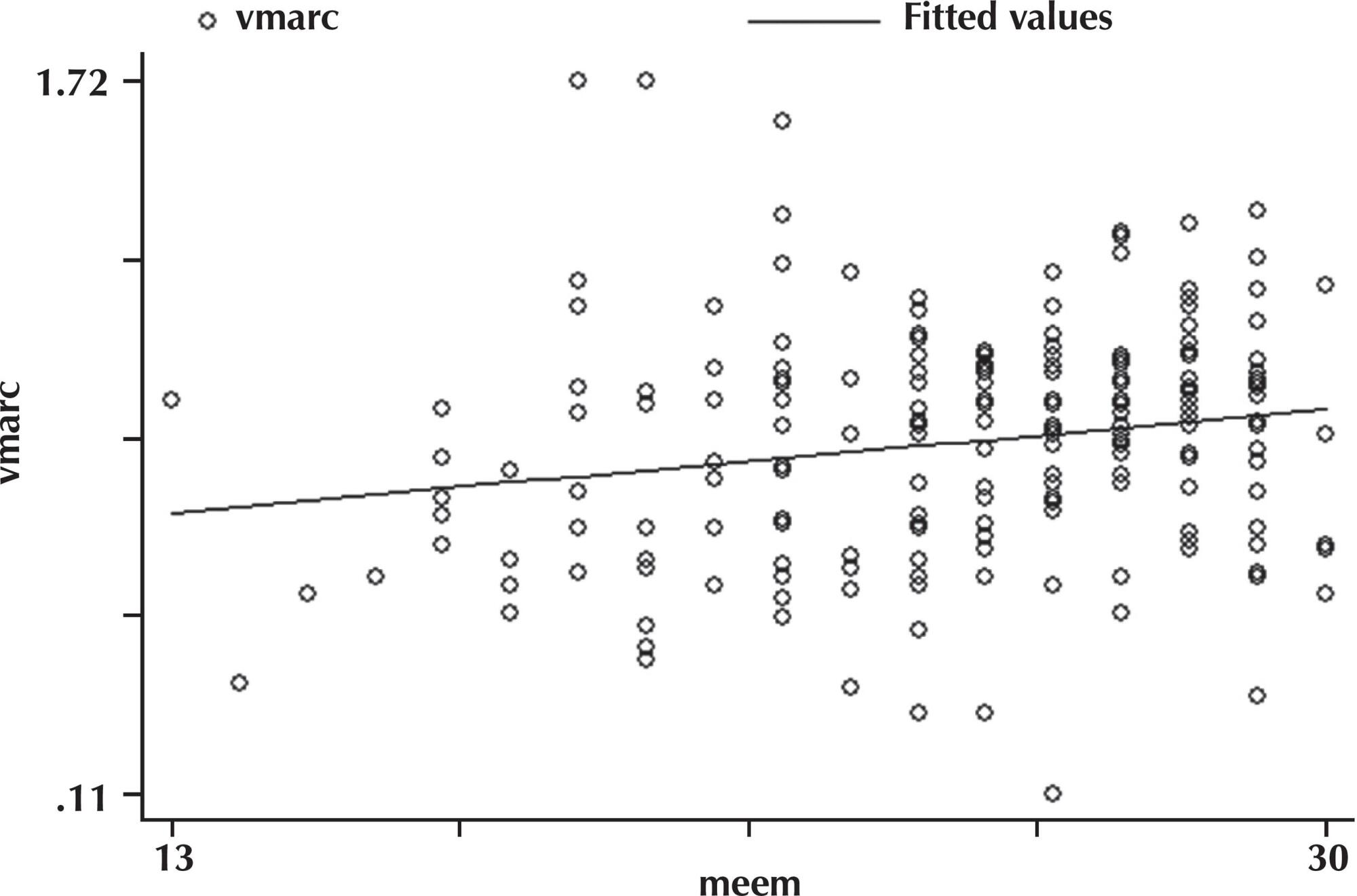
-
01-01-2015
Fluid and dietary restriction’s efficacy on chronic kidney disease patients in hemodialysis
Revista Brasileira de Enfermagem. 2015;68(6):1154-1162
Abstract
Fluid and dietary restriction’s efficacy on chronic kidney disease patients in hemodialysis
Revista Brasileira de Enfermagem. 2015;68(6):1154-1162
DOI 10.1590/0034-7167.2015680622i
Views0See moreABSTRACT
Objective:
to identify self-care measures to manage fluid and dietary restrictions and assess their effectiveness.
Method:
descriptive-correlational study and cluster analysis with 254 chronic renal failure patients on regular hemodialysis program, handled by hemodiafiltration. We evaluated the effectiveness of self-care by interdialytic weight gain (IWG) and by potassium and phosphorus serum pre-dialysis serum levels.
Results:
several self-care measures were significantly correlated with a lower IWG and a lower level of pre-dialysis phosphorus. Patients most often use measures to reduce salt consumption than measures to restrict potassium and dietary phosphorus. The spouse provides important support dietary management. Subjects who use more often the self-care measure are mostly female, are older, less IWG and have a higher Kt/V.
Conclusion:
these results can contribute to the nursing educational support.
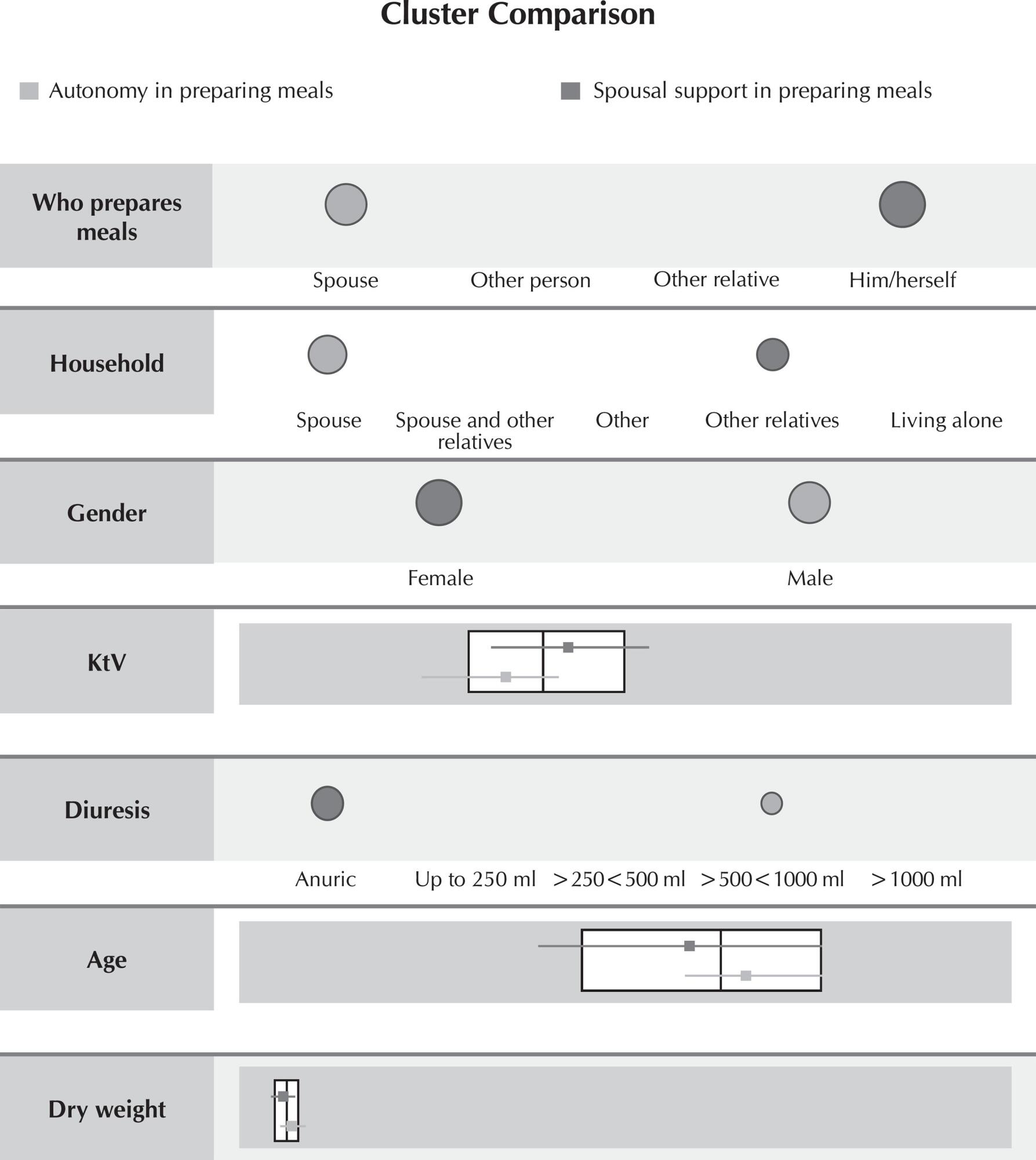
-
01-01-2015
Validation of newborn positioning protocol in Intensive Care Unit
Revista Brasileira de Enfermagem. 2015;68(6):1147-1153
Abstract
Validation of newborn positioning protocol in Intensive Care Unit
Revista Brasileira de Enfermagem. 2015;68(6):1147-1153
DOI 10.1590/0034-7167.2015680621i
Views0See moreRESEARCH
Objective:
to verify the positioning indications of newborn sand build a standard operating procedure protocol for newborn positioning in Neonatal Intensive Care Unit (NICU).
Method:
for protocol validation, the Delphi technique was used ,in which expert nurses in the field reviewed the proposed procedure.
Results:
we present the results of this validation in a protocol form, to contribute to the discussion about newborn positioning in NICU and standardization of nursing care related to positioning. We evaluated ten indicators, in which there was agreementof100.0% in seven, and of80% in three, above the 60% recommended by the validation technique.
Conclusion:
given the importance of newborn positioning in NICU for its neuromuscular development, this study contributes to the adoption of an evidence-based practice for nursing.
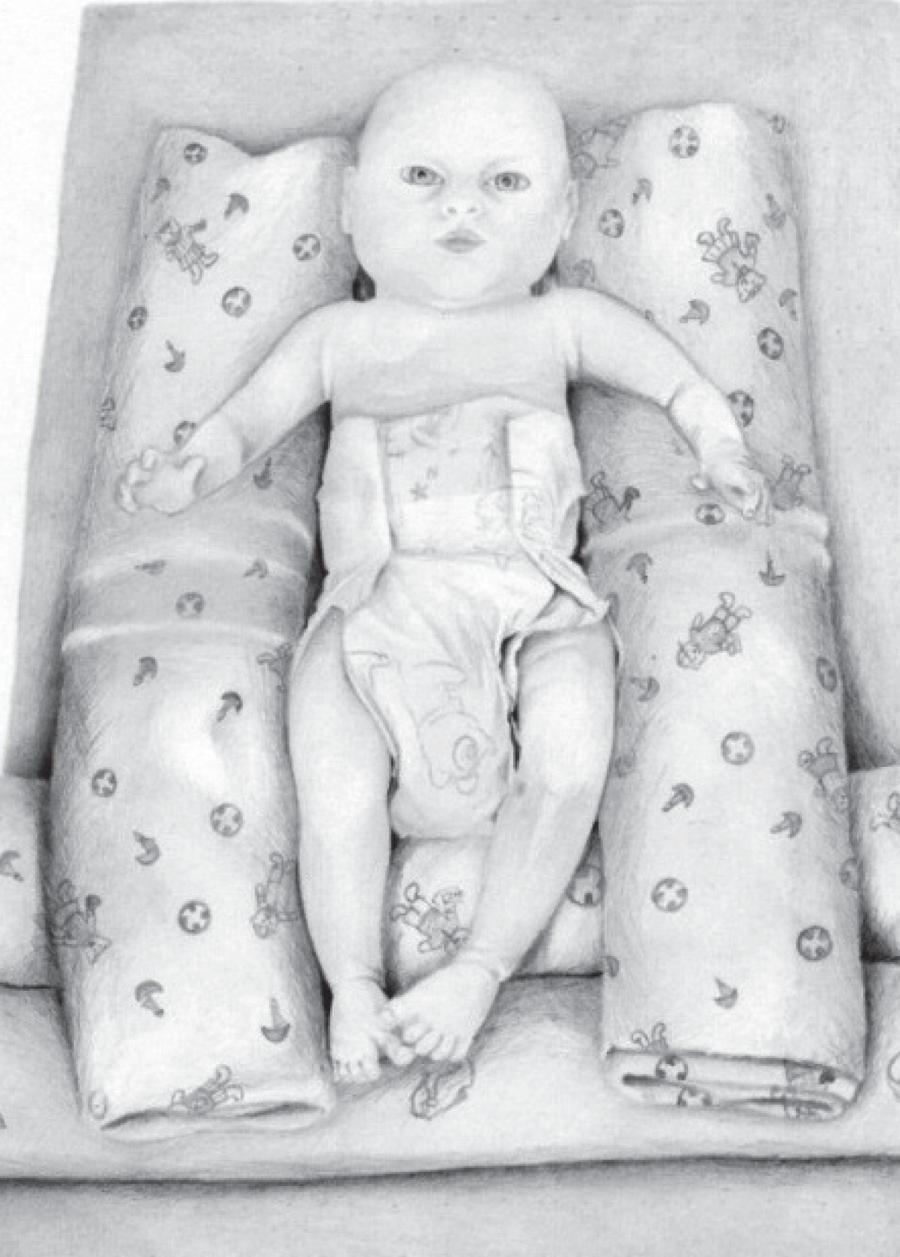
-
01-01-2015
Patient safety culture in a bone marrow transplantation unit
Revista Brasileira de Enfermagem. 2015;68(6):1139-1146
Abstract
Patient safety culture in a bone marrow transplantation unit
Revista Brasileira de Enfermagem. 2015;68(6):1139-1146
DOI 10.1590/0034-7167.2015680620i
Views0See moreABSTRACT
Objective:
evaluate the patient safety culture in the perspective of health professionals from a bone marrow transplantation unit of an oncology research center, at a reference hospital for cancer treatment in Santa Catarina, Brazil.
Method:
a quantitative cross-sectional study that used the Safety Attitudes Questionnaire was conducted between August and September 2013. The study analyzed 33 professional surveys. Statistical data analysis used descriptive and inferential statistics.
Results:
among the dimensions analyzed, only “job satisfaction” reached a mean score above 75, considered positive in terms of patient safety culture.
Conclusion:
the dimensions of safety culture present in the survey have to be valued by professionals and managers to allow safe patient care.
-
01-01-2015
Job satisfaction of nursing staff in a university hospital
Revista Brasileira de Enfermagem. 2015;68(6):1130-1138
Abstract
Job satisfaction of nursing staff in a university hospital
Revista Brasileira de Enfermagem. 2015;68(6):1130-1138
DOI 10.1590/0034-7167.2015680619i
Views0See moreABSTRACT
Objective:
identify the determinants of job satisfaction of the nursing staff of a public university hospital.
Method:
secondary study with mixed data approach and simple and multiple linear regression. A total of 115 subjects participated in the study, 41 nurses and 74 nursing assistants and technicians. The data collection occurred in 2013 using the QST-Caism questionnaire.
Results:
education, hierarchical level and workplace constitute job satisfaction determinants. However, age, gender, job and work period did not show this relationship. More educated workers held low job satisfaction if exercised not graduated nursing functions.
Conclusion:
graduated workers who perform high school functions are more unsatisfied than those who have high school function and qualification.
-
01-01-2015
Medical waste in mobile prehospital care
Revista Brasileira de Enfermagem. 2015;68(6):1122-1129
Abstract
Medical waste in mobile prehospital care
Revista Brasileira de Enfermagem. 2015;68(6):1122-1129
DOI 10.1590/0034-7167.2015680618i
Views0See moreABSTRACT
Objective:
the objective of this study is to identify how Medical Waste (MW) is managed in Mobile Prehospital Care (MPC) services in the state of São Paulo as well as characterize and quantify this waste.
Method:
exploratory and descriptive field study with data collection based on the methodology proposed by the Pan American Health Organization (PAHO), which was conducted over eight consecutive days to identify the production and characteristics of generated waste.
Results:
it was found that the MW management of the MPC is not yet in line with the requirements of RDC 306/04, which could affect the occupational safety of workers, patients, the community, and the environment.
Conclusion:
it is recommended for the health managers to focus on this issue. The lack of studies with regard to MPC also indicates the need for further studies on the waste management.

-
01-01-2015
Severe lactational mastitis: particularities from admission
Revista Brasileira de Enfermagem. 2015;68(6):1116-1121
Abstract
Severe lactational mastitis: particularities from admission
Revista Brasileira de Enfermagem. 2015;68(6):1116-1121
DOI 10.1590/0034-7167.2015680617i
Views0See moreABSTRACT
Objective:
to identify characteristics of women who have suffered severe lactational mastitis.
Method:
a descriptive, retrospective, documentary, quantitative study was performed. Data were collected from patient records of 114 hospitalized women from January of 2009 to December of 2013. Data were analyzed by using descriptive statistics.
Results:
a higher percentage of severe lactational mastitis was found in young, primiparous women who had completed high school, who had no partner, and did not have a job; 96.5% of women had breast complications before admission and remained hospitalized an average of 4.4 days; at discharge, 23.7% of women had weaned their infants.
Conclusion:
this study showed that severe lactational mastitis can cause great harm to the woman and the baby.
-
EXPERIENCE REPORT01-01-2017
Focus group on qualitative research: experience report
Revista Brasileira de Enfermagem. 2017;70(2):424-429
Abstract
EXPERIENCE REPORTFocus group on qualitative research: experience report
Revista Brasileira de Enfermagem. 2017;70(2):424-429
DOI 10.1590/0034-7167-2016-0091
Views1See moreABSTRACT
Objective:
to report the experience of applying the focus group technique for production of data in qualitative research.
Method:
four group sessions were held from May to June 2015, with the participation of professionals from the public sector of PHC and from specialized service.
Results:
the way focus group was developed is described in steps: planning, recruitment, ambience, group sessions, and evaluation.
Conclusion:
we highlight that the focus group, as a technique to produce data in collective space, can contribute not only to the construction of knowledge in Nursing, but also to the research approach with the assistance practice.

-
RESEARCH01-01-2017
Guide of attributes of the nurse’s political competence: a methodological study
Revista Brasileira de Enfermagem. 2017;70(3):526-534
Abstract
RESEARCHGuide of attributes of the nurse’s political competence: a methodological study
Revista Brasileira de Enfermagem. 2017;70(3):526-534
DOI 10.1590/0034-7167-2016-0483
Views0See moreABSTRACT
Objective:
To build and validate a guide of attributes of the nurse’s political competence.
Method:
Methodological research. This study comprised the construction of the instrument through literature review; experts validation of pre-established attributes for composing the guide; and clinical validation in the nurses work environment/reality. The data collection took place in the months from August to October 2014, and the analysis was based on the content analysis of Bardin and use of Epi info 3.5. All ethical precepts have been complied with.
Results:
From 29 attributes found in the literature, 25 have been validated by experts. Clinical/practical validation involved the participation of 43 nurses, who observed that the attributes are not articulated with the professional practices developed by them.
Conclusion:
The attributes of the nurse’s political competence were identified with support of literature. It is concluded that the professionals still have limited and fragmented perception of political competence, expressing difficulty/limitation.
-
ORIGINAL ARTICLE10-09-2023
Independent and combined effects of lifestyle behaviors on adolescent health-related quality of life
Revista Brasileira de Enfermagem. 2023;76(4):e20220780
Abstract
ORIGINAL ARTICLEIndependent and combined effects of lifestyle behaviors on adolescent health-related quality of life
Revista Brasileira de Enfermagem. 2023;76(4):e20220780
DOI 10.1590/0034-7167-2022-0780
Views0See moreABSTRACT
Objective:
To investigate the independent and combined effects of lifestyle behaviors, including physical activity, sedentary behavior, sleep duration and food intake, in the health-related quality of life (HRQoL) of Brazilian adolescents.
Methods:
Cross-sectional school-based study, with the participation of 306 adolescents aged 14 to 18 years. A questionnaire was applied with structured questions to collect lifestyle behaviors data. Perception of the HRQoL was identified using the Kidscreen-27. The study used covariance analysis and linear regression models for statistical analysis.
Results:
Adolescents who reported ≤ 2 hours/day of screen-based sedentary behavior and sleep duration equivalent to 8-10 hours/night presented significantly higher HRQoL. Adolescents who reported joint adherence ≥ 3 healthy lifestyle behaviors demonstrated approximately two [OR=2.12] to three times [OR=3.04] more chance of presenting higher perceptions of HRQoL.
Conclusion:
Although healthy lifestyle behaviors had a positive independent effect on HRQoL, joint adherence to healthy behaviors enhances the cumulative effect.

-
12-04-2023
Sleep quality of nurses who worked in coping with COVID-19: an integrative review
Revista Brasileira de Enfermagem. 2023;76(6):e20230007
Abstract
Sleep quality of nurses who worked in coping with COVID-19: an integrative review
Revista Brasileira de Enfermagem. 2023;76(6):e20230007
DOI 10.1590/0034-7167-2023-0007
Views0See moreABSTRACT
Objective:
to analyze sleep quality of nurses who worked coping with COVID-19 in scientific evidence.
Methods:
an integrative review, carried out in seven databases, including studies between December 2021 and June 2022, without language restrictions. The sample consisted of 15 primary studies.
Results:
nurses working in hospital, intensive care, outpatient care and teaching institutions constitute a vulnerable group for sleep disorders: latency, duration, efficiency and quality. The disorders identified involved insomnia at varying levels of severity: daytime dysfunction and morning sleepiness. Night work and low capacity for self-care were determinants of impaired sleep patterns.
Final considerations:
the COVID-19 pandemic contributed to greater vulnerability of nurses to changes in sleep, requiring strategies for risk management and well-being promotion.

-
ORIGINAL ARTICLE12-08-2023
Care for older adults with disabilities in Long Term Care Facility
Revista Brasileira de Enfermagem. 2023;76:e20220767
Abstract
ORIGINAL ARTICLECare for older adults with disabilities in Long Term Care Facility
Revista Brasileira de Enfermagem. 2023;76:e20220767
DOI 10.1590/0034-7167-2022-0767
Views0See moreABSTRACT
Objective:
to analyze the constitution of care offered to older adults with disabilities, from Long Term Care Facility professionals’ perspective.
Methods:
this is a discourse analysis based on the post-structuralist framework. Participants in this study are professionals involved in the care for older adults, totaling 14 respondents, 13 women and one man.
Results:
from professionals’ perspective, there is a fine line between caring for older adults with disabilities and maintaining their autonomy. Care in which autonomy is restricted predisposes older adults to a process of dependency.
Final considerations:
caring for older adults with disabilities constitutes the challenge between caring and maintaining independence. Thus, older adult-centered care should be taken as a premise so that their individualities are respected.
-
ORIGINAL ARTICLE12-08-2023
Polypharmacy, potentially inappropriate medications and associated factors among older adults with hypertension in primary care
Revista Brasileira de Enfermagem. 2023;76:e20220785
Abstract
ORIGINAL ARTICLEPolypharmacy, potentially inappropriate medications and associated factors among older adults with hypertension in primary care
Revista Brasileira de Enfermagem. 2023;76:e20220785
DOI 10.1590/0034-7167-2022-0785
Views0See moreABSTRACT
Objective:
to identify the prevalence and associations of polypharmacy and potentially inappropriate medication use among older adults with hypertension treated in primary care.
Methods:
a cross-sectional study carried out with older adults with hypertension treated at a Family Health Strategy unit. Data collection included analysis of medical records, interviews and multidimensional assessment of older adults. Socio-demographic information and clinical variables were collected. Statistical analysis was performed by multiple logistic regression.
Results:
polypharmacy prevalence was 38.09%, and potentially inappropriate medication (PIM), 28.57%. There was a significant association between polypharmacy and PIM use, altered sleep and ethnicity. PIM use was associated with polypharmacy, worse family functioning, and absence of a caregiver. Cognitive decline reduces the prevalence of these medications.
Conclusions:
polypharmacy and PIM use among older adults with hypertension represent a problem in this population, especially among the most vulnerable.
-
REVIEW12-08-2023
Educational technologies used to promote self-care for people with diabetes mellitus: integrative review
Revista Brasileira de Enfermagem. 2023;76:e20230049
Abstract
REVIEWEducational technologies used to promote self-care for people with diabetes mellitus: integrative review
Revista Brasileira de Enfermagem. 2023;76:e20230049
DOI 10.1590/0034-7167-2023-0049
Views0See moreABSTRACT
Objective:
To summarize the scientific productions that used educational technologies to promote self-care for people with diabetes.
Method:
Integrative review carried out from October 2022 to January 2023, in the databases: LILACS; Scopus; Embase; PubMed/MEDLINE and CINAHL. The search was paired, and the sample consisted of ten articles. The levels of evidence were analyzed by the Hierarchy of Evidence for Intervention Studies, and the results were synthesized for interpretation of the findings.
Results:
The educational technologies identified to promote self-care were: mobile applications, interactive platforms, print, telemonitoring, video and simulation. The focus of the contents was on the promotion of foot care, prevention of neuropathy, self-management, knowledge, and expectation of people with diabetes and prevention of acute complications.
Conclusion:
The synthesis of knowledge about educational technologies to promote self-care for people with diabetes pointed to the need for robust evidence.

-
ORIGINAL ARTICLE05-03-2024
What is the burden of multimorbidity and the factors associated with its occurrence in elderly Brazilians?
Revista Brasileira de Enfermagem. 2024;77(1):e20220809
Abstract
ORIGINAL ARTICLEWhat is the burden of multimorbidity and the factors associated with its occurrence in elderly Brazilians?
Revista Brasileira de Enfermagem. 2024;77(1):e20220809
DOI 10.1590/0034-7167-2022-0809
Views0See moreABSTRACT
Objective:
To estimate the prevalence of multimorbidity in elderly people and its association with sociodemographic characteristics, lifestyle, and anthropometry.
Methods:
This was a cross-sectional study using data from the National Health Survey, 2019. A total of 22,728 elderly individuals from all 27 Brazilian states were randomly selected. Poisson regression models with robust variance were employed, and a significance level of 5% was adopted.
Results:
The prevalence of multimorbidity was 51.6% (95% CI: 50.4-52.7), with the highest estimates observed in the South and Southeast. Multimorbidity was associated with being female (aPR = 1.33; 95% CI: 1.27-1.39), being 80 years old or older (aPR = 1.12; 95% CI: 1.05-1.19), having low education (aPR = 1.16; 95% CI: 1.07-1.25), past cigarette use (aPR = 1.16; 95% CI: 1.11-1.21), insufficient physical activity (aPR = 1.13; 95% CI: 1.06-1.21), and screen use for 3 hours or more per day (aPR = 1.13; 95% CI: 1.08-1.18).
Conclusion:
Multimorbidity affects more than half of the elderly population in Brazil and is associated with social, demographic, and behavioral factors.

-
ORIGINAL ARTICLE10-21-2019
Consumption of alcohol and drugs and school absenteeism among high school students of public schools
Revista Brasileira de Enfermagem. 2019;72(6):1692-1698
Abstract
ORIGINAL ARTICLEConsumption of alcohol and drugs and school absenteeism among high school students of public schools
Revista Brasileira de Enfermagem. 2019;72(6):1692-1698
DOI 10.1590/0034-7167-2018-0828
Views0See moreABSTRACT
Objective:
To evaluate the relation between the consumption of alcohol and other drugs and school absenteeism in high school students of public schools in the 30 days prior to data collection.
Method:
Cross-sectional study of quantitative character conducted from May to September 2017, with 282 high school students of public schools of Mossoró-RN. We used a closed questionnaire with questions about drug consumption as our instrument of analysis. We performed hierarchical binary logistic regression by using the SPSS 20.0.
Results:
In bivariate analysis, the relation between absenteeism and drug consumption patterns proved to be significant to those who engage in heavy episodic drinking of alcohol and in the use of tobacco, inhalants and marijuana. The adjusted regression model only included the variables tobacco and heavy episodic drinking of alcohol.
Conclusion:
The hierarchical binary logistic regression analysis corroborated with absenteeism outcomes, explaining it in 12.3% of cases.
-
ORIGINAL ARTICLE01-14-2022
Knowledge, attitudes and practices related to sexually transmitted infections of men in prison
Revista Brasileira de Enfermagem. 2022;75:e20201273
Abstract
ORIGINAL ARTICLEKnowledge, attitudes and practices related to sexually transmitted infections of men in prison
Revista Brasileira de Enfermagem. 2022;75:e20201273
DOI 10.1590/0034-7167-2020-1273
Views0See moreABSTRACT
Objectives:
to analyze the knowledge, attitudes, and practices related to sexually transmitted infections of men in prison.
Methods:
qualitative study, based on the methodology Knowledge, Attitude and Practice, conducted with 30 men in prison. The study applied individual interviews submitted to the analyze of the discourse.
Results:
the incipient knowledge of men was associated with: self-illness and the others’, diagnosis, and perception of risk behavior, pervaded by distrust or lack of understanding of the rapid test for detection. The attitudes involved culpability of partnerships, non-adherence to prevention inputs, and resistance to look for health services. The practices are linked to health care after the identification of the disease, use of penile condoms, and attention to the partnership.
Conclusions:
the reduced knowledge about Sexually Transmitted Infections makes attitudes stereotyped, stigmatized, compromised by the level of education. The level of health care and the limits of deprivation of liberty weaken the practices.
-
09-16-2019
Leprosy educational practices with adolescents: an integrative literature review
Revista Brasileira de Enfermagem. 2019;72(5):1397-1404
Abstract
Leprosy educational practices with adolescents: an integrative literature review
Revista Brasileira de Enfermagem. 2019;72(5):1397-1404
DOI 10.1590/0034-7167-2017-0458
Views0See moreABSTRACT
Objectives:
to identify scientific evidence in the literature regarding educational actions on leprosy developed with adolescents.
Method:
an integrative review of the literature, with the following research question: what are the leprosy educational practices currently being developed with adolescents? The search was performed in the following databases: MEDLINE, Scopus, LILACS, CINAHL, BVS Hanseníase and other sources, using “adolescent”; “leprosy”; “health education”; “public health”, and “public health practice” as keywords. Results: the sample was comprised of nine studies. Leprosy educational practices with adolescents verifiably promote change in knowledge when they are based on constructivist methodologies. The nurse is recognized as a professional with potential for developing these educational practices. Final considerations: actions for leprosy education with adolescents do lead to changes in knowledge, but new research is needed to evaluate their effectiveness in further improving this knowledge as well as changing behaviors and practices.

-
ORIGINAL ARTICLE10-21-2019
Work overload and risk behaviors in motorcyclists
Revista Brasileira de Enfermagem. 2019;72(6):1479-1484
Abstract
ORIGINAL ARTICLEWork overload and risk behaviors in motorcyclists
Revista Brasileira de Enfermagem. 2019;72(6):1479-1484
DOI 10.1590/0034-7167-2018-0279
Views0See moreABSTRACT
Objective:
to analyze the association between work overload and risk behaviors adopted by motorcyclists.
Method:
a cross-sectional study of injured motorcycle drivers hospitalized at the Hospital da Restauração Governador Paulo Guerra in the city of Recife, PE, from May to September 2016. A questionnaire was applied containing sociodemographic variables related to work overload and risk behaviors adoption. Odds Ratio (OR) and 95% Confidence Interval were used to analyze the association between the variables.
Results:
there was a predominance of males (97.6%), mean age 31.44 years (SD = 9.50). There was an association of sleep/fatigue at the accident time with difficulties carrying out work tasks (OR = 3.7), feeling tired during work (OR = 4.6) and feeling under pressure to carry out work tasks (OR = 3.5).
Conclusion:
work overload was associated with risk behaviors adoption. It is believed that this fact can have an impact on the occurrence and severity of accidents.
-
ORIGINAL ARTICLE10-21-2019
Educational technology for fatigue management related to antineoplastic chemotherapy
Revista Brasileira de Enfermagem. 2019;72(6):1519-1525
Abstract
ORIGINAL ARTICLEEducational technology for fatigue management related to antineoplastic chemotherapy
Revista Brasileira de Enfermagem. 2019;72(6):1519-1525
DOI 10.1590/0034-7167-2018-0505
Views0See moreABSTRACT
Objective:
To construct and validate an educational technology (ET) on fatigue and non-pharmacological strategies for the management of this symptom in people with cancer undergoing outpatient antineoplastic chemotherapy.
Method:
This is a methodological study composed of three stages: 1) elaboration of the ET using the theoretical-methodological model of Doak, Doak and Root; 2) validation of content and appearance by seven nurses via the content validity index (CVI); and 3) a pilot test with 10 patients.
Results:
The ET “Knowing and coping with fatigue” contemplates the definition of fatigue, its causes and the interventions of physical exercise practice, sleep hygiene, energy conservation and behavioral intervention. The overall CVI obtained with the judges was 0.95.
Conclusion:
The ET presented content and appearance validity for health education regarding fatigue related to antineoplastic chemotherapy in outpatient cancer patients.
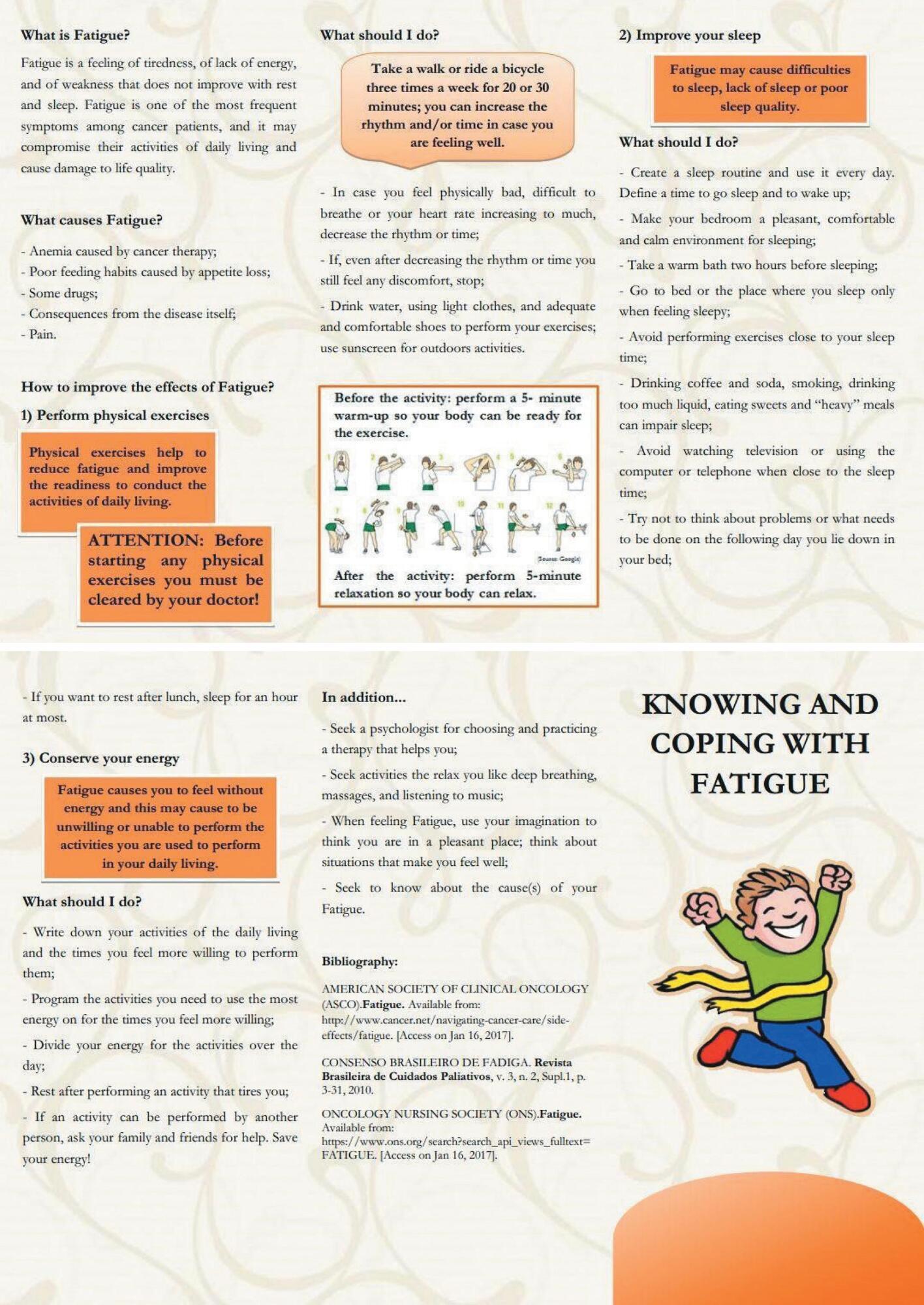
-
ORIGINAL ARTICLE10-21-2019
Functional independence of elderly patients who fell: a follow-up study
Revista Brasileira de Enfermagem. 2019;72(6):1715-1722
Abstract
ORIGINAL ARTICLEFunctional independence of elderly patients who fell: a follow-up study
Revista Brasileira de Enfermagem. 2019;72(6):1715-1722
DOI 10.1590/0034-7167-2018-0845
Views0See moreABSTRACT
Objective:
to evaluate, in emergency hospital service and at home, the functional independence of elderly people who fell.
Method:
longitudinal study with 151 elderly. Functional Independence Measure (FIM) was used. Statistical tests were performed with univariate and bivariate analysis.
Results:
mean of total FIM value in the hospital was 70.4; and at home 84.3 (p <0.001). Independence was lower in the motor domain, in “self-care”, “mobility” and “locomotion” dimensions, in the two evaluations (p <0.001). Dependence reduced from 97.3% elderly in the hospital to 82.8% at home (p <0.001). There was a negative correlation between total FIM and age, number of medications, number of diseases and hospitalization time in both evaluations. Femoral and hip fractures were associated with lower total FIM values (p <0.001).
Conclusion:
the elderly had less independence in the hospital compared to at home, with greater impairment in the motor domain and “self-care”, “mobility” and “locomotion” dimensions, in the two moments evaluated.

-
ORIGINAL ARTICLE05-24-2021
Content validation of an educational booklet for asthma control and management in children
Revista Brasileira de Enfermagem. 2021;74:e20200353
Abstract
ORIGINAL ARTICLEContent validation of an educational booklet for asthma control and management in children
Revista Brasileira de Enfermagem. 2021;74:e20200353
DOI 10.1590/0034-7167-2020-0353
Views0See moreABSTRACT
Objective:
to validate the content and appearance of the educational booklet “You can control your child’s asthma – let’s learn together?” with parents and caregivers of children with asthma.
Methods:
this is a methodological study, carried out with 34 mothers and caregivers of children, from two to 10 years old, diagnosed with asthma. The educational booklet validation was performed using Content Validity Index (CVI) and assessment of comprehension, attractiveness, self-efficacy, persuasion, and cultural acceptance domains.
Results:
the booklet was considered clear (99.8%) and relevant (100%), with a global CVI of 0.99. Domain assessment proved to be an easy-to-understand tool, culturally appropriate, attractive, with persuasive power and promoting self-efficacy.
Conclusion:
the booklet is valid and adequate for promoting the self-efficacy of parents and caregivers in childhood asthma control and management, potentially scalable to other realities of outpatient care.
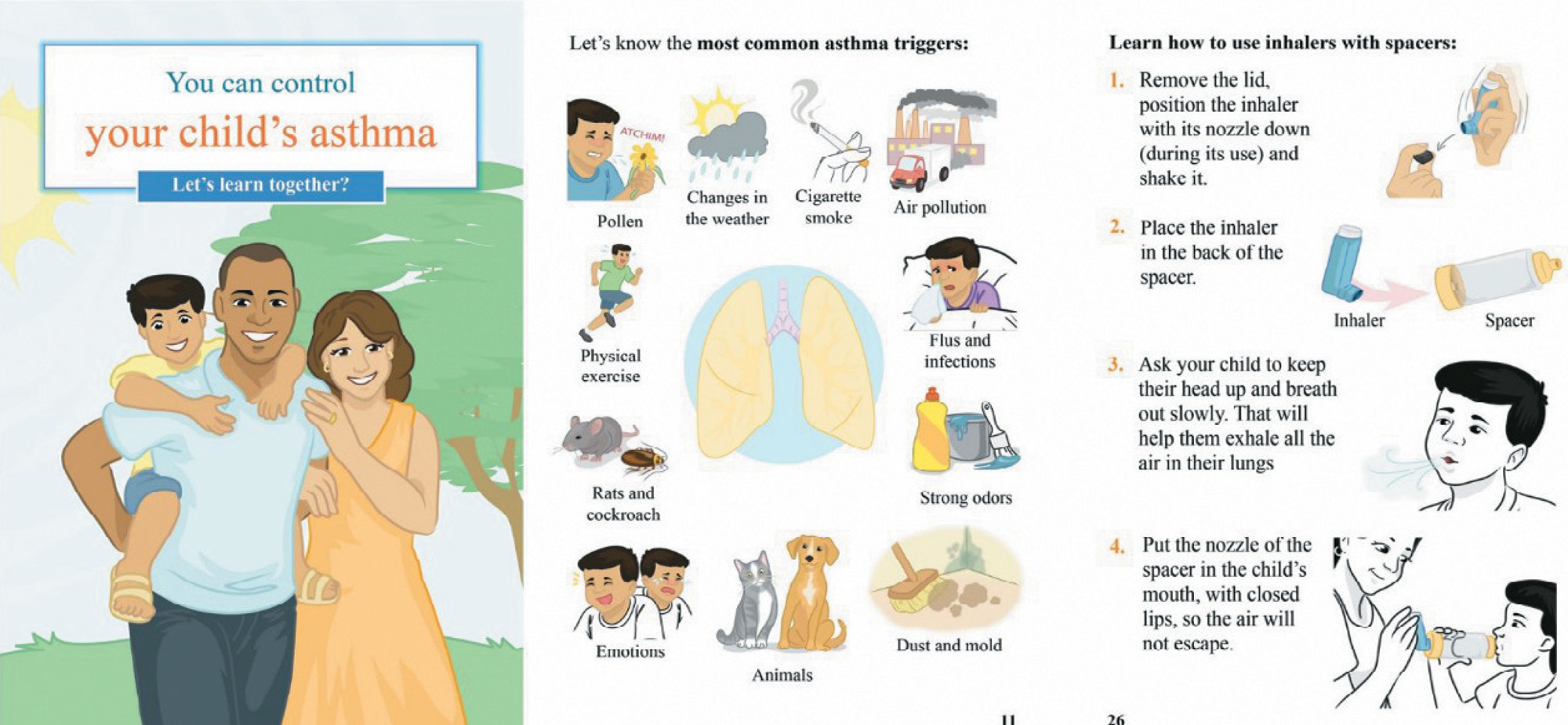
-
ORIGINAL ARTICLE04-22-2020
Care coordination and longitudinality in primary health care in the Brazilian Amazon
Revista Brasileira de Enfermagem. 2020;73(3):e20180841
Abstract
ORIGINAL ARTICLECare coordination and longitudinality in primary health care in the Brazilian Amazon
Revista Brasileira de Enfermagem. 2020;73(3):e20180841
DOI 10.1590/0034-7167-2018-0841
Views0See moreABSTRACT
Objectives:
to evaluate the attributes of primary health care, care coordination and longitudinality, from the perception of the professional and patients in the state of Amazonas, Brazil.
Methods:
quantitative evaluative study, in which was used an external evaluation instrument with 469 professionals and 1,888 patients from 367 primary health care facilities that adhered to the Program for Improving Access and Quality of primary health care (Portuguese acronym: PMAQ) standardized by the Ministry of Health. Data were grouped by multivariate cluster analysis in order to find a classification of primary health care from the perspective of professionals and patients.
Results:
the attributes of coordination and longitudinality are still expressed in a weak and undeveloped way in the Brazilian Amazon scenario.
Conclusions:
it is necessary to recognize the organizational barriers and what could promote conditions for the performance of health care teams in the perspective of a continuous, integral and coordinated care.
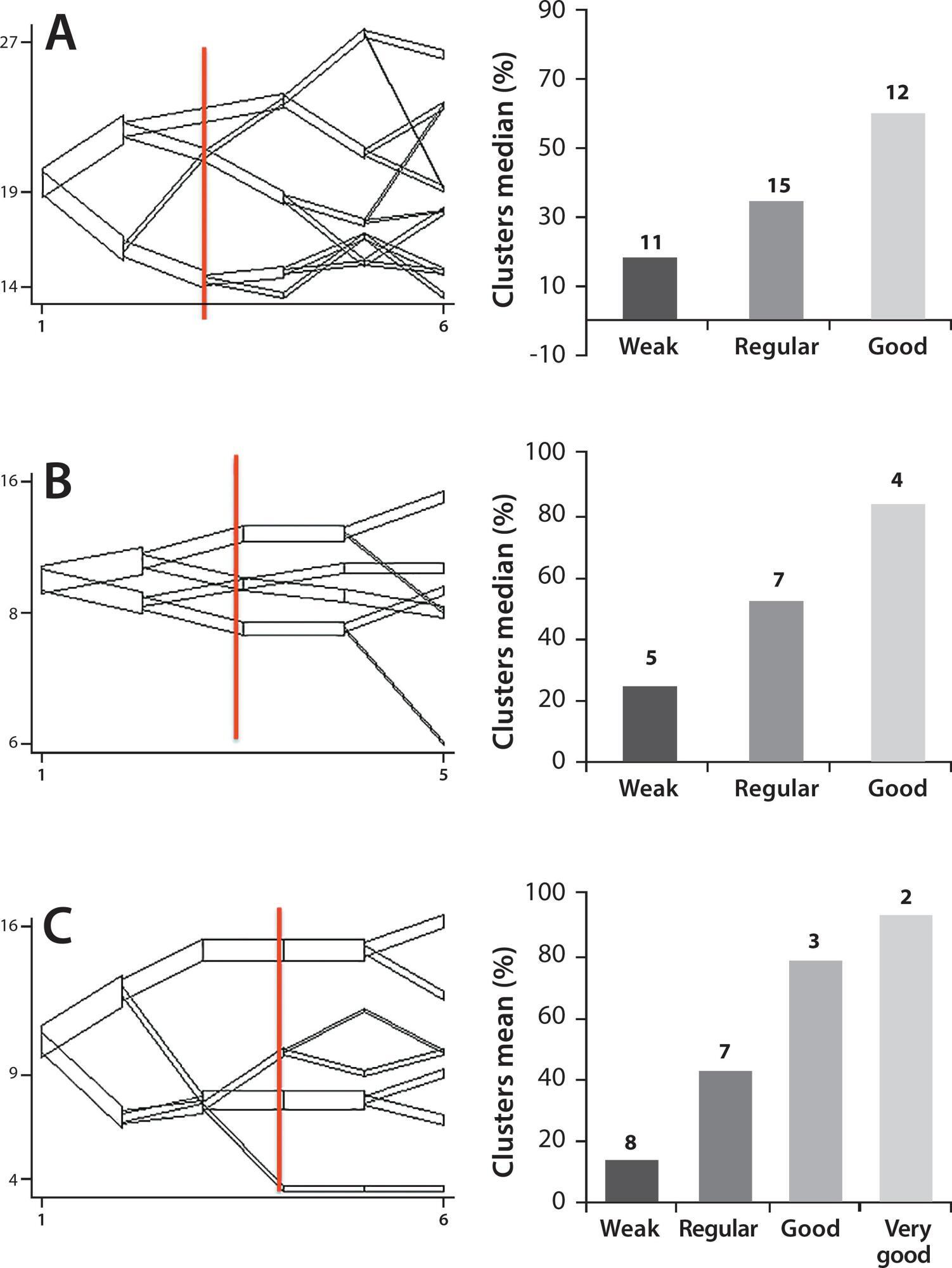
Search
Search in:
Nuvem de Tags
Adolescente (85) Atenção Primária à Saúde (239) COVID-19 (91) Criança (91) Cuidados de Enfermagem (269) Educação em Enfermagem (151) Educação em Saúde (139) Enfermagem (930) Enfermagem Pediátrica (86) Estudantes de Enfermagem (77) Estudos de Validação (131) Família (87) Idoso (208) Promoção da Saúde (99) Qualidade de Vida (104) Saúde do Trabalhador (86) Saúde Mental (145) Saúde Pública (82) Segurança do Paciente (150) Tecnologia Educacional (100)



